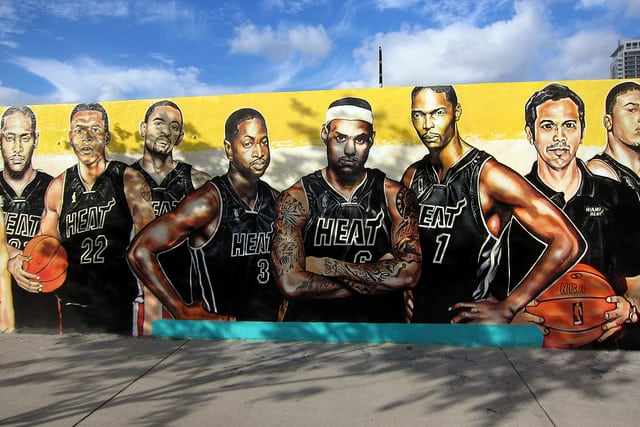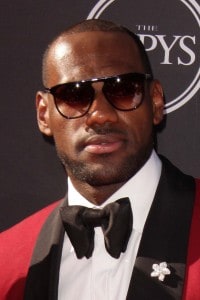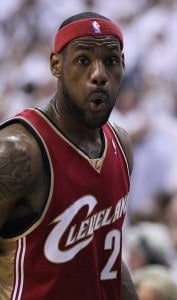As nearly any basketball fan or sentient being knows by now, LeBron James announced that he is “coming home” to play for the Cleveland Cavaliers. Three Jesuit sports fans sat down at The Jesuit Post headquarters to talk about the decision–or, rather, “the decision 2.0.”
Michael Rossmann (MR) was born during the same Midwestern winter eight days after LeBron James. Despite being so close in age, they haven’t exactly been close in, say, basketball skills or endorsement deals. From the time that both graduated high school, Rossmann has been a big fan and staunch defender of James.
Brian Strassburger (BS) was turned on to NBA basketball at a young age when his family spent two years in Phoenix, where he embraced the underdogs. While his allegiance changed with his address to Denver, he continued to cheer against superstars from Jordan to Shaq to Kobe. Enter, LeBron James. Unable to resist his likeability, and spurred by a recent movement away from sports hate, Strassburger is trying to sort out his feelings in the wake of recent news.
Adam DeLeon (AD) was raised in Cleveland and brainwashed at an early age to live and die with all Cleveland (and Ohio) sports. He vividly remembers the two times he ever saw his uncles cry: after “the fumble” and at his grandfather’s funeral. He epitomizes the phrase, “You can take the boy out of Cleveland, but you can’t take the Cleveland out of the boy.”
MR: Adam, ignoring LeBron’s plea to be mature and not dwell on past comments, I gotta remind you: you emphatically told me a month ago that LeBron was never coming back. Well, he is. How did you receive the news?
AD: You now have an example of maturity to learn from, Mike! If you would have asked me just over a year ago which of these two events would actually happen–a Jesuit Pope or Lebron coming back to Cleveland–I would have told you, without a doubt, Lebron wasn’t coming back to Cleveland! It hasn’t really set in yet.
MR: So, Brian, we’ve had some days to process “The Decision 2.0,” “The Essay,” or whatever else you want to call this. What’s your reaction?
BS: Excitement! It’s the exact opposite feeling I had in 2010 when he left Cleveland to join the Miami Heat. “The Decision 2.0” couldn’t have been any more different than his nationally televised debacle, and my reaction follows suit. Before, I wanted to see the Heat lose. This time around? I’m on his side! I know you’ve always been over there, so what’s the water like?
MR: My mind is blown. He could have stayed in Miami, not pay state income tax, be farther from a river that has caught on fire (truth hurts, Adam), and people wouldn’t have thought less of him. But he’s going back to Cleveland. I’m amazed. It’s not just a great sports story; it’s a great human story.
BS: Talk about a different message this time around! In 2010, everyone remembers LeBron’s words: “I’m taking my talents to South Beach.” Those words came off as arrogant and flashy: the glamour of the locale, the talents of LeBron, a self-centered focus. It’s a phrase you’d never dare to say with sincerity.
This time around? “I’m coming home.” Those words strike at the heart of every person who has had to leave the place they call home. We can identify with that sentiment. Can’t you picture a movie montage around it?
MR: Yes, except that this time there was nothing on screen! LeBron chose to write a first-person essay. In a sports world saturated by God knows how many different 24-hour TV channels, he chose the written word. And I don’t think it could have been more powerful.
BS: The biggest sticking point to LeBron’s return was the infamous letter penned by Cavaliers owner, Dan Gilbert. There was some talk over which team was better suited to win, where LeBron could make the most money, and what would best secure his “legacy.” But everyone kept going back to this letter. How easy would it be for LeBron to hold a grudge. Isn’t that a tendency in all of us? We hold onto anger and internalize it. We use it to justify actions. “See, I can thrive without you. You should have appreciated me more!” It can wreck friendships, poison a work environment, and divide families.
LeBron’s announcement to return to the Cavs addressed this straight on. He talked about Gilbert’s letter, the booing from Cavs fans, the burning of jerseys. It was hard to take – not just for him, but for his family. That’s personal. Despite it all, LeBron didn’t settle into anger. He thought about the other side. We call that empathy.
“What if I were a kid who looked up to an athlete, and that athlete made me want to do better in my own life, and then he left? How would I react? I’ve met with Dan [Gilbert], face-to-face, man-to-man. We’ve talked it out. Everybody makes mistakes. I’ve made mistakes as well. Who am I to hold a grudge?” – LeBron in Sports Illustrated (emphasis added)
Sound familiar?
MR: I know! Seriously, are Pope Francis and LeBron James reading from the same playbook?
BS: “Who am I to judge?” Gotta love it when a sports star and the pope drop the same lines.
MR: Adam, I’d love to get your thoughts on how Clevelanders (is that what you’re called?) have been portrayed in the media and whether LeBron’s recent decision may or may not expand the narrative compared to what was described after the first decision (and for the last 50 years).
AD: First, Mike, you’re welcome for the EPA (founded to address the problem of environmental pollution faced by MANY other cities in the country in the 1970s). Second, I’m sick and tired of the national media’s anti-Cleveland bias. Yes, we have never won an NBA title, or won a Super Bowl (we did win the NFL championship in 1964), and we haven’t won a World Series since 1948. But Clevelanders (yes, that’s what we are called, Mike) have never hid behind excuses like curses (I’m looking at you, Boston and Chicago). We’ve had TERRIBLE SPORTS TEAMS, but we continually root for our teams as a matter of pride.
It’s strange how the national media fixates on the losing moments in Cleveland sports history.
If we are talking about the history of Cleveland sports teams, I’d want to talk about Larry Dolby, the first African American to break the color barrier in the AL, who, along with Satchel Paige, became the first African American MLB players to win a World Series in 1948. If you wanted to talk about more recent accomplishments, look no further than the then-record 455 consecutive regular season games sold out by Cleveland Indians fans. Finally, Cleveland “fans” that burned Lebron’s jersey are not the first “fans” to do this (I’m trying not to look at you Miami), but apparently they are the only ones who are constantly portrayed as doing so. (FYI, everyone in Cleveland did not burn their jerseys: some gave them to the homeless in Miami in 2010, while most others just kept them and just did not wear them.)
MR: Adam, as a Clevelander who has left home, what did you think of LeBron’s description of ‘coming home’?
AD: I was shocked to read in his letter that LeBron “always believed that [he]’d return to Cleveland and finish [his] career there.” Not that he has to tell me or any other Cleveland fan what his personal feelings are, but I never saw anything that indicated that he would come back, especially with his desire to win “multiple” championships.
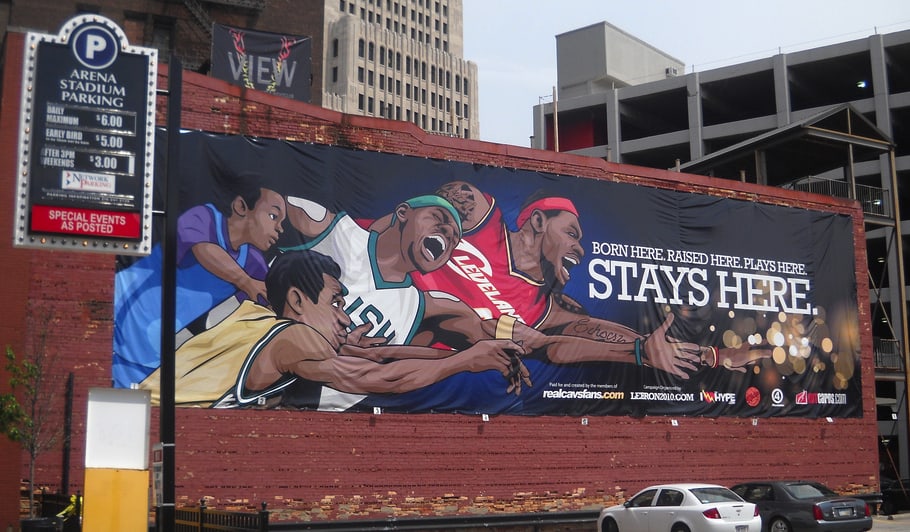
A 2010 poster in Cleveland which reads: “Born here, raised here, plays here, STAYS HERE.”
A son of Ohio indeed.
Kenneth Watson / Flickr
Another interesting thing about Lebron that might have influenced his return was how he grew up. As a young boy, he moved from home to home, missing over 100 days of school when he was young because he moved so much. I remember him often speaking to the media about how he wanted to provide a stable home environment for his children because he lacked that as he grew up. Family and friends are very important to LeBron. They always have been. Unlike many professional athletes who use money and championships as the main criteria for making career decisions (something I don’t blame them for), LeBron also made his family and friends a priority in his decision. That he identifies himself as a “son” of Ohio, I can understand and agree with him completely for doing so. I am amazed and applaud him for coming home. Yet, these are notions that “regular” people use all the time when making decisions, so what he did was not extraordinary. However, these are not criteria professional athletes use all the time, which does make this decision extraordinary.
MR: And while I think it’s ridiculous that people tried so hard to read the tea leaves of LeBron’s wife’s Instagram postings, it’s clear that she is also “coming home” and pretty happy about it. As Jalen Rose just said in his own interpretation, “happy wife, happy life.” Family clearly factored largely in his decision.
BS:Family matters: didn’t we learn that from Carl Winslow in the 1990’s?
How about a look into the crystal ball. What does the future look like for LeBron? Everyone’s making basketball predictions, but let’s also get a little more human: what are your hopes for him out of all this?
MR: Of course, as a LeBron fan, the idea of watching James, Irving, Wiggins, and Love (if that can somehow happen) together excites me–kind of like a James, Bosh, and 2010-vintage Wade collection (and not like a James, still-pretty-good Bosh, father-time-has-taken-a-toll 2014 Wade).
I have no expectations, however, for a championship for Cleveland (nor would the people of San Antonio). I have to wonder, though: has LeBron just stepped into a can’t-lose situation? Looking at the current roster, no one should expect them to win a championship, unlike in Miami where winning two titles still feels like a letdown. Imagine if he does bring a title to Cleveland after 141 seasons of pro sports without a title!
AD: A championship in Cleveland… The Champions of the World… I can only imagine what it would be like. I want to know so bad. Do I think that the Cavs will win the NBA Title this year? No. We are a young team that doesn’t like to play defense. We have a new coach who will try to instill a new attitude of winning and set up a new system for the team. We also have no depth as we cleared cap space by getting rid of our backups and roll players. But we do have the greatest player on the planet, playing on our team, a team that he wanted to come back to. I like our chances…
MR: An even more interesting question to me is what all of this will mean beyond basketball–and LeBron has made it clear through his letter that he’s moving for more than “basketball reasons.” I can’t imagine a Cleveland native who has settled in a different place asking herself, “WWLD? (What would LeBron Do?)” That being said, might it have some larger impact on Northeastern Ohio as he seems to hope?
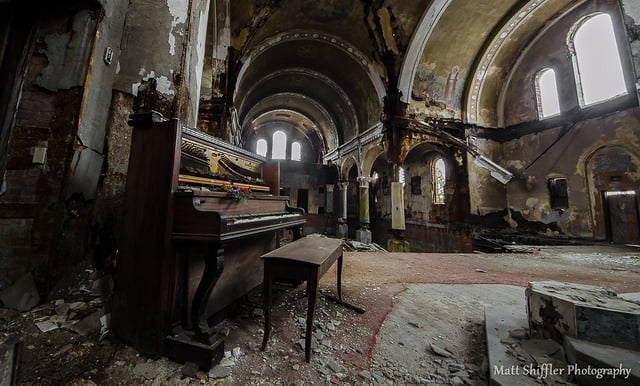
An abandoned church in Cleveland. Can LeBron help “solve the economic disfunction and hardships of a Rust Belt city”?
Matt Shiffler / Flickr
AD: Sports and economics, a complicated relationship, especially in a city like Cleveland. The Cavs sold out the upcoming season within 8 hours of “the return.” In a recent article by the Cleveland Plain Dealer, it is estimated that LeBron coming home will bring an extra $50 million annually for the city and region. An interesting side note: I heard a lot of people in Cleveland talk about how LeBron had a responsibility to come back to Cleveland because of the positive economic impact alone his return would have on the city and region. To burden LeBron with a responsibility to solve the economic disfunction and hardships of a Rust Belt city is an unfair expectation, but one talked about before he made his recent announcement. And yet LeBron recognized this reality and even acknowledged that his coming home was “bigger than basketball.” He gets “it” and he embraces it more than any athlete I can think of. He is not and will not be the savior of Cleveland’s economy, but he is willing and deliberately does his part to help and contribute to the region, which demonstrates his character.
BS: Will this affect other athletes in free agency? Everyone thought LeBron had redefined free agency when he teamed up with Bosh and Wade. Superstars make so much money outside the game that they can afford to take less to win. Would the league turn into a couple of super-teams and a bunch of also-rans? Suddenly LeBron signs with Cleveland, and the landscape changes. Melo rebukes Chicago to stay in New York. Are these related?
MR: Everyone was waiting on LeBron to make his decision, and only afterwards did the other dominoes start falling, but I think it has an impact on the league far beyond this free agency cycle. One of the things I’d mention in my defense of LeBron after the 2010 decision was that this was a powerful move by players, the actual value-creators of the league, to do things on their terms. Last week, LeBron did it again. After players listened to basketball owners complain about financial hardship in the most recent CBA and then watched the Clippers get sold for $2 billion, the maximum contract LeBron signed was more evidence of his effort to establish player power. So, in addition to transforming an entire region and giving us so many gospel parallels, LeBron is also giving us a lesson in labor rights. That’s why they call him King James!
MR: So, as we wind things up, do you have any parting words?
AD: I’ve always got something to say when it comes to Cleveland, especially with regard to Cleveland sports. I’ve heard some Cleveland fans say they would rather not win a championship than win a championship with LeBron back on the team. I don’t understand this mindset. It’s not like the city of Cleveland or the Cavs had to beg LeBron to come back. In fact it was the opposite. He chose to come back.
And to those who think Cleveland fans who once “hated” LeBron and now “forgive” him are hypocrites, I don’t
understand this mindset either. When a player is on your team you root for them. When a player leaves (by trade or free-agency) you do not have to continue rooting for them. They don’t play for your team. If a former player comes back and plays for your team, then you root for them. Cleveland fans will welcome LeBron back and embrace him. That’s what it means to be a fan, a Cleveland fan.
BS: I love how much of this story takes us beyond the X’s and O’s of a basketball court. As an NBA fan, I’m excited. Can’t wait for the season to start. Can’t wait to see LeBron walk to that scorers table and pick up the chalk again. But even beyond all that, whether you’re a fan or not, there’s a lot of food for thought. Our conversation ventured into themes of empathy, forgiveness, discernment, the value of family and coming home. This was about LeBron James, right??
MR: Well, I thought it was, but now I’m not so sure. Only 104 days until the NBA season actually starts!

